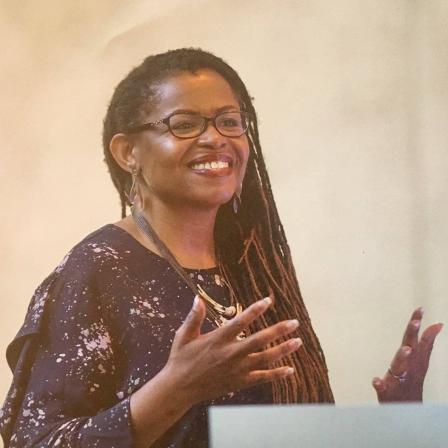

Director of The Texas Freedom Colonies Project™ and an Assistant Professor of Urban Planning, and co-founder of the African American Digital Humanities Working Group at Texas A&M University

Dr. Andrea Roberts is Director of The Texas Freedom Colonies Project™ and an Assistant Professor of Urban Planning, and co-founder of the African American Digital Humanities Working Group at Texas A&M University(TAMU). She is also a fellow with TAMU’s Hazard Reduction and Recovery Center, Center for Heritage Conservation, Institute for Sustainable Communities, and the Africana Studies Program. Dr. Roberts holds a Ph.D. in community and regional planning from The University of Texas at Austin (2016), where her specialization areas were African diaspora studies and historic preservation. She also holds an M.A. in government administration from the University of Pennsylvania (2006) and a B.A. in political science from Vassar College (1996). Her 12 years of nonprofit management, community development, and government administration experience inform her efforts to move disappearing African American communities--facing sprawl, gentrification, and resource extraction --from the margin to the center of public discourse, pedagogy, and research.
Her research frames planning & historic preservation practices as avenues to social justice. Her scholarship and digital humanities platforms tell the story of freedom colonies, African American settlements founded after Juneteenth in Texas between 1865-1930. The Journal of Planning History, Buildings and Landscapes, the Journal of the American Planning Association, the Journal of Community Archaeology and Heritage, Planning Theory & Practice, and Environmental Justice have published her peer-reviewed scholarship on Black planning history, cultural landscape theory, Black feminist preservation, and participatory preservation. Her commentary has also appeared in Newsweek, The Conversation, and the National Trust for Historic Preservation’s Leadership Forum.
She is also a 6th generation Texas, whose ancestors were formerly enslaved and founded freedom colonies. In 2014, she founded The Texas Freedom Colonies Project. The Project’s student researchers, community collaborators, and the freedom colony diaspora contribute to The TXFCP Atlas, a publicly accessible map and database filled with descendants' memories, visual histories, landscape features, and reports on contemporary life in 410 of the 557 known settlements in Texas. In addition to showing previously unmapped Black communities, the map contains spatial layers which contain Hurricane Harvey impacts, pending transportation projects and governance boundaries. The Atlas has become the first publicly available statewide platform to make disparate ecological and development impacts on historic Black communities visible to the public, practitioners, and policymakers. Consequently, the Atlas has integrated descendants’ heritage values and sense of place into urban planning processes in which they had previously been invisible. The Texas Department of Transportation, the Army Corps of Engineers, and the Council of Texas Archeologists use the platform to identify Black historic resources at risk.
Dr. Roberts is also the Consultant/Owner of Freedom Colonies Project, LLC, which provides research design support, diversity, equity, and inclusion (DEI) workshops and programming for preservation organizations, and public speaking. Her clients include the Texas Historical Commission, the Urban Land Institute, the American Society of Landscape Architects, the University of Virginia’s Center for Cultural Landscapes, and Florida State University’s Legacy Communities Project.
She advises Texas’ State Historic Preservation Officer concerning National Register nominations as a Texas State Board of Review member and is a Mellon Foundation National Monument Audit Advisory Board member. She has received awards for her engaged scholarship from The Vernacular Architecture Forum and the Urban Affairs Association. Dr. Roberts is a 2020-21 Whiting Public Engagement Fellow and was a 2020 Visiting Scholar at Yale’s Gilder Lehrman Center for the Study of Slavery, Resistance, Abolition. She is currently writing a book about Black historic preservation practice for The University of Texas Press.